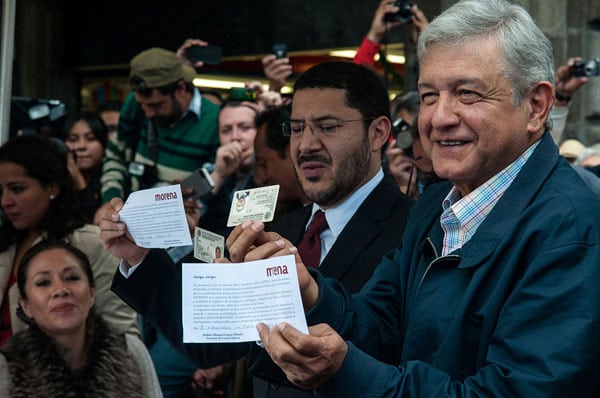
July 2, 2018; New York Times and the Washington Post
This past Sunday, Andrés Manuel López Obrador (often referred to by his initials “AMLO”) was elected president of Mexico. On December 1st, he will be sworn into office and become the country’s first avowedly leftist president since Lázaro Cárdenas.
Cárdenas, by the way, was president of Mexico from 1934 to 1940. Yes, it has been that long since the left has led in Mexico. Cárdenas is known for nationalizing Mexico’s oil reserve, supporting labor unions, and redistributing land from large haciendas (plantations or ranches) into peasant-owned ejidos. As with all political leaders, the legacy of Cárdenas is mixed; that said, he is widely considered the most popular president in Mexican history.
Some, including the New York Times, perhaps to make the story relatable to a US audience, have drawn parallels to Donald Trump. As Azam Ahmed and Paulina Villegas write in the Times:
The allure of his [López Obrador’s] message is steeped in the language of nostalgia for a better time—and in a sense of economic nationalism that some fear could reverse important gains of the last 25 years.
In this way, and others, the parallels between Mr. López Obrador and President Trump are hard to ignore. Both men are tempestuous leaders, who are loath to concede a political fight. Both men lash out at enemies and view the media with suspicion.
Now, maybe similarities exist, but the differences between López Obrador and Trump are also “hard to ignore”—far harder to ignore. Writing in the Washington Post, Kevin Sieff points out:
Sign up for our free newsletters
Subscribe to NPQ's newsletters to have our top stories delivered directly to your inbox.
By signing up, you agree to our privacy policy and terms of use, and to receive messages from NPQ and our partners.
In the past, López Obrador has likened Trump’s attacks on Mexicans to the way Nazis talked about Jews. He has proposed organizing protests against Trump’s immigration policy, with people dressed in white forming a human chain along the length of the US border. On Sunday night, after his victory was announced, he said any relationship with the United States would need to include a defense of “our migrant countrymen” living north of the border.
There are some other notable differences, such as:
- Unlike Trump, López Obrador has a political track record, having served from 2000 to 2005 as mayor of Mexico City. Unlike Washington DC, the Mexican federal city has statehood status and, with close to nine million residents, is the country’s second most populous state. In other words, López Obrador effectively was state governor. In office, his government was known for investing in social programs and infrastructure, including increasing pensions for the elderly and double-decking some clogged highways. When he stepped down as mayor in 2005 to contest the presidency, he left office with an 80-percent approval rate—not bad.
- Unlike Trump, López Obrador is not new to politics, having been runner-up for president in 2006 and 2012. In 2006, he lost by less than one percentage-point of the popular vote. Some of López Obrador’s “tempestuous” reputation comes from his refusal to concede the legitimacy of this loss, amidst allegations of election irregularities. In 2012, López Obrador fell short again, with Enrique Peña Nieto prevailing by a margin of 38 percent to 32 percent.
- Unlike Trump, this year López Obrador won the popular vote. By a lot! Current official estimates suggest he will receive 53 percent of the vote, with runner-up Ricardo Anaya far behind at under 23 percent.
Lastly, of course, López Obrador’s platform is vastly different. “The core promises of Mr. López Obrador’s campaign,” note Ahmed and Villegas are “to end corruption, reduce violence and address Mexico’s endemic poverty.”
In his victory statement, López Obrador said, “The state will cease to be a committee at the service of a minority and will represent all Mexicans, rich and poor, those who live in the country and in the city, migrants, believers and nonbelievers, to people of all philosophies and sexual preferences.” Mr. López Obrador has also, note Ahmed and Villegas, “vowed to cut his own salary and raise those of the lowest paid government workers, campaigned on a narrative of social change, including increased pensions for the elderly, educational grants for Mexico’s youth and additional support for farmers.”
Now whether López Obrador and the social movements that backed him can change Mexico remains to be seen. Hopes are high, which also means that the risk of disillusionment is great.
But the need for change is evident. In addition to drug violence and corruption, Mexico has extraordinary economic inequality. A 2016 report from the Organization for Economic Cooperation and Development (OECD) finds that the top one percent of Mexicans own 50 percent of the nation’s wealth—exceeding even high US inequality levels. Patricio Solís, a sociologist at the Colegio de Mexico, notes that, “Two factors driving income inequality in Mexico are wage-restriction policies and the limited redistributive role of the state through tax policies…Today, the minimum wage in Mexico is the lowest among the OECD countries and one of the lowest in Latin America.” As for taxes, Solís adds that taxes play a “very limited role…in the reduction of income inequality. In 2010, taxes only reduced inequality by 2 percent, compared to an average of 27 percent among OECD countries.”—Steve Dubb













